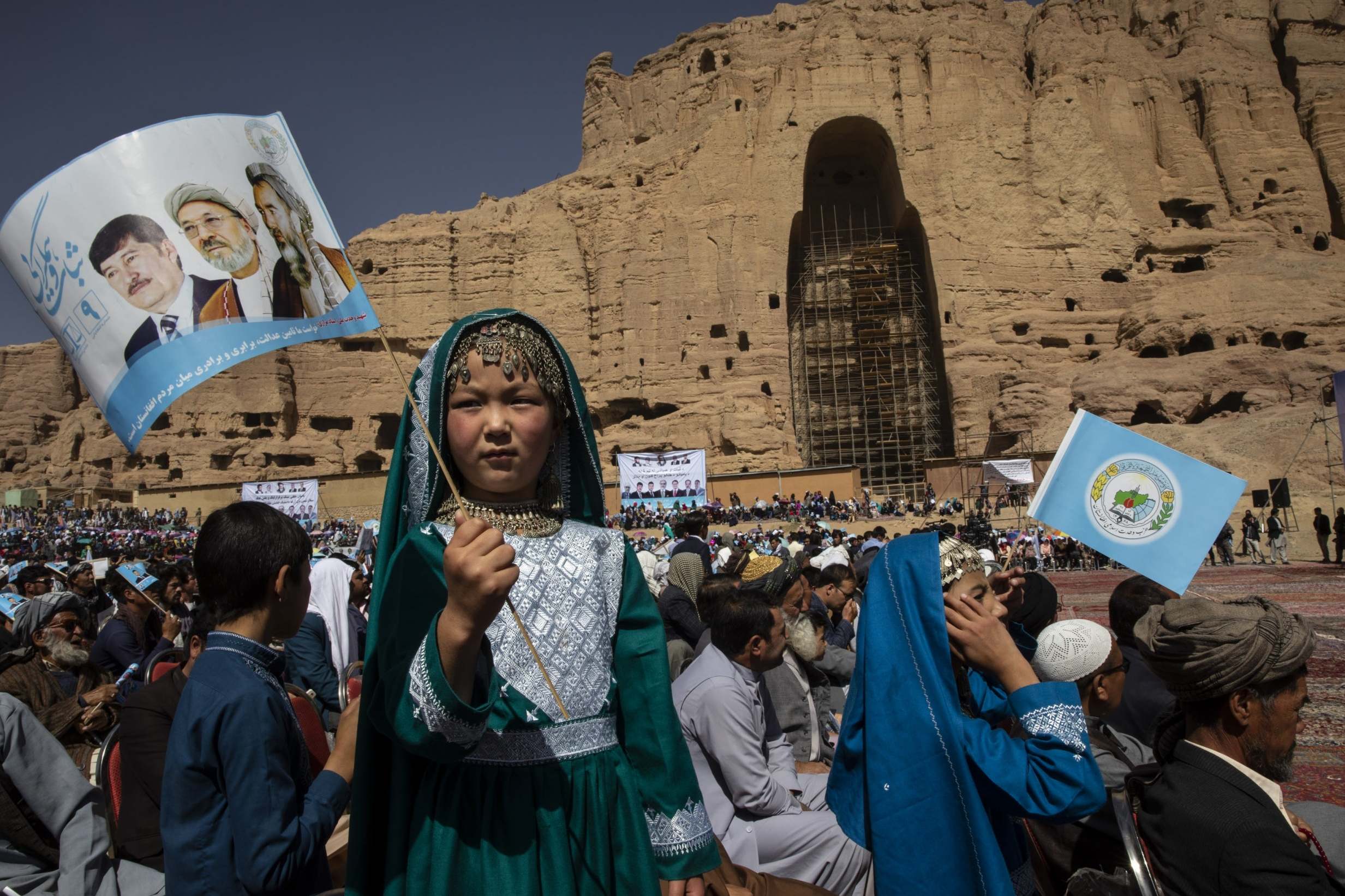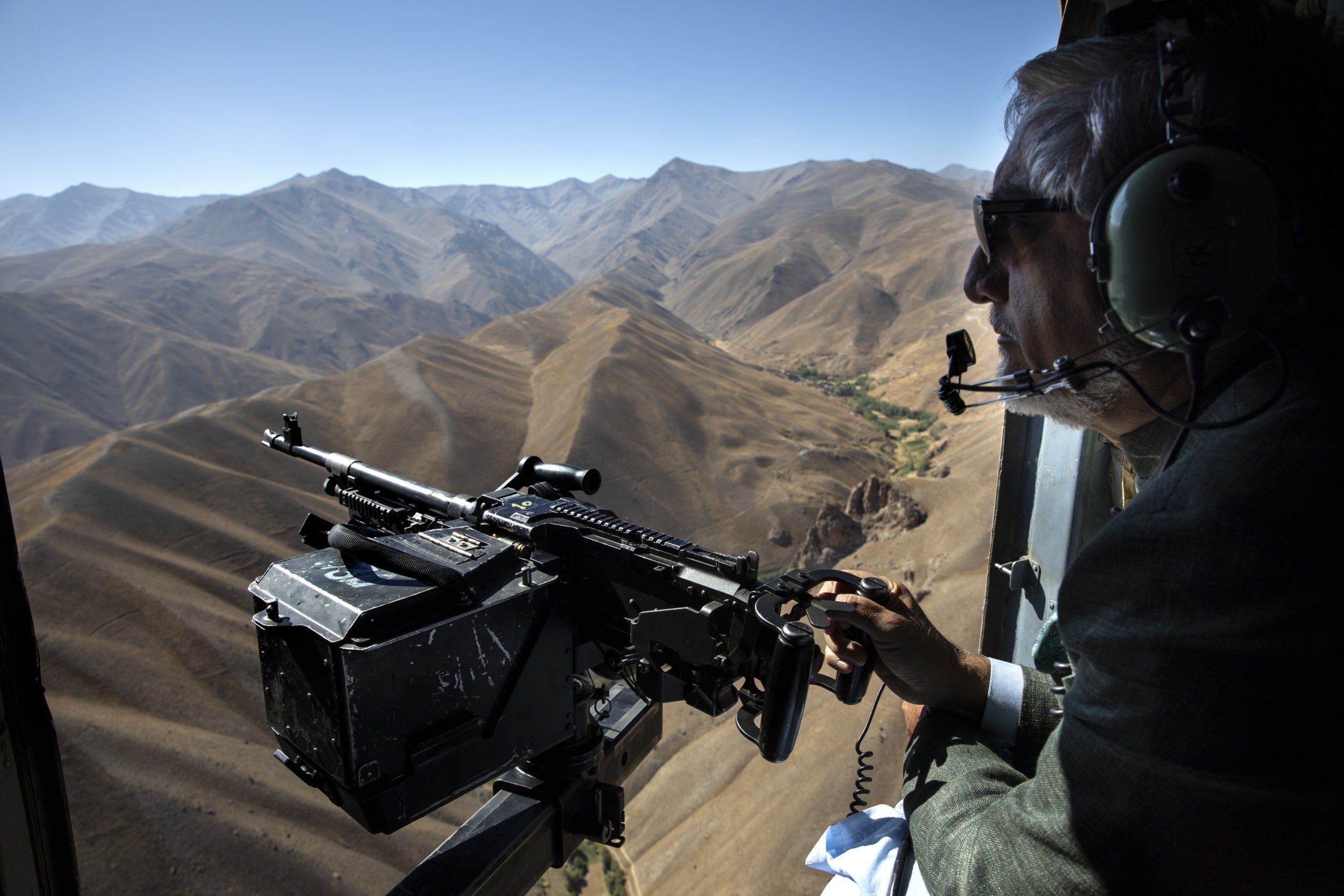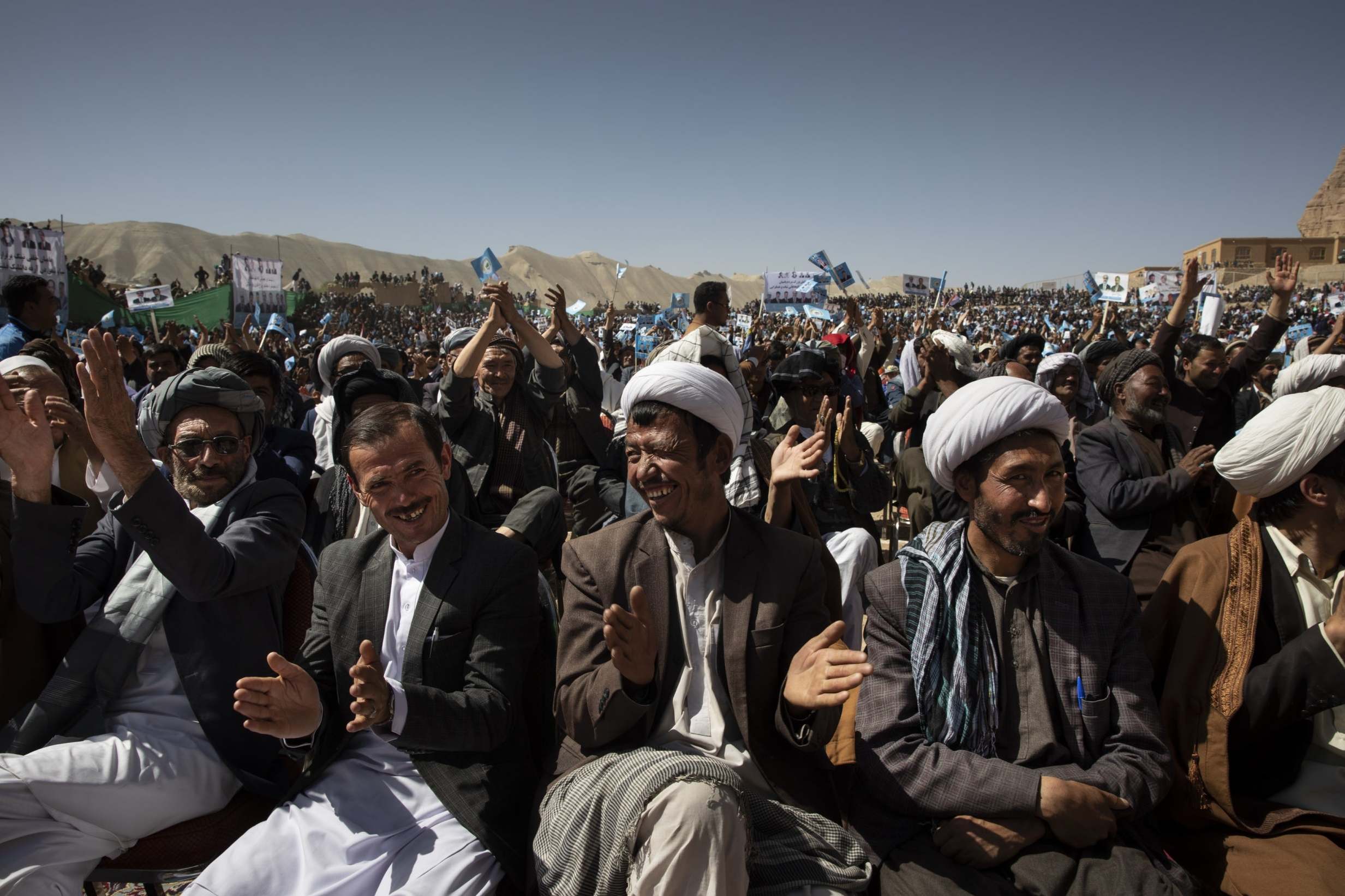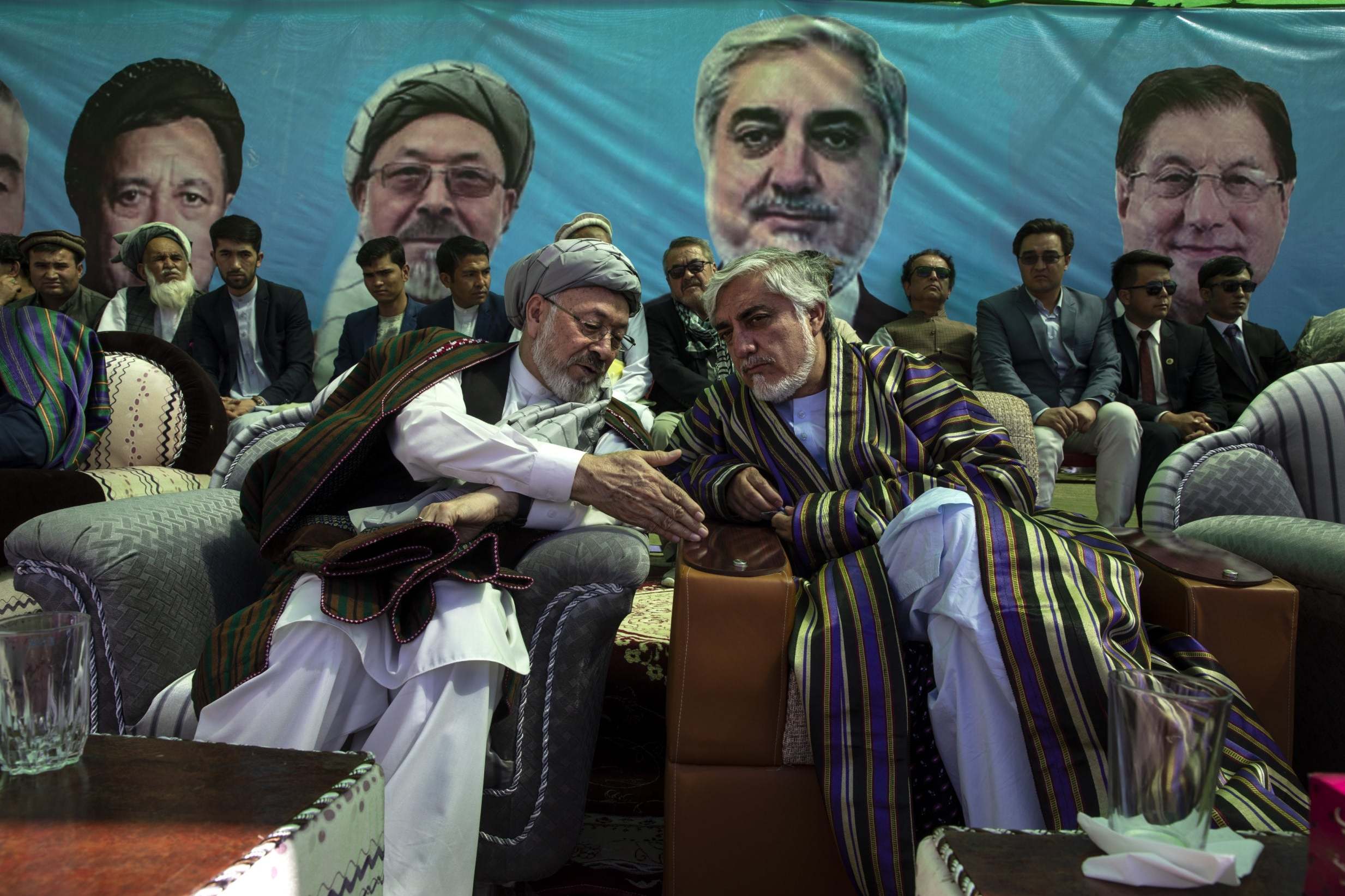On the Afghan campaign trail in the shadow of the destroyed Buddhas of Bamiyan, talk of Taliban return divides
‘The Taliban are a reality,’ concedes presidential contender Abdullah Abdullah, telling Kim Sengupta that the Afghan government should consider a power-sharing deal


One of the last rallies of the election campaign takes place under the shadow of the most internationally familiar symbol of religious intolerance in Afghanistan – the cliffs of Bamiyan where the magnificent statues of Buddha had stood from the sixth century before being blown up by the Taliban.
There is another shadow looming over the 10,000 people gathered in the valley below: the growing and foreboding prospect that 18 years after Mullah Mohammad Omar’s regime fell, the same year the statues were destroyed, the Taliban may be edging back to power.
The prolonged talks held in Qatar between the US and the Taliban were suspended by Donald Trump following a Taliban attack in Kabul in which an American soldier was killed. But there is expectation that they will resume again in the future, with the US president desperate to get US forces back home before the election next year, allowing him to claim credit for ending the longest war in America’s history.
Many of the candidates in the coming Afghan election, including some who would not have countenanced this happening in the past, now say the push for Taliban involvement in government is going to get stronger over the coming months and may be difficult to resist. This is likely, they say, not just because of the signals from Washington but the violent reality on the ground, with the Taliban and other Islamist groups like al-Qaeda and Isis controlling expanding swathes of territory, and war weariness from a population suffering relentless bombings and shootings.
The star attraction at the Bamiyan rally is Abdullah Abdullah, who had been co-leader of the current National Unity Government with President Ashraf Ghani and who is now his main rival at the polls.

As we fly up to Bamiyan together from Kabul on an army helicopter, Dr Abdullah, who had the title of chief executive in the administration, tells of the need to find a way to end the bloody conflict, and how power-sharing with the Taliban could be the answer.
“The Taliban are a reality in the country, their forces, their supporters, their foreign connections. Everybody agrees you cannot finish this war by just fighting and killing everybody. Hopefully the Taliban see it as well,” he said.
“The point is to move to a solution, and one I would like to have is an interim set-up. All sorts of possibilities have to be looked at, including power-sharing. Then there is a permanent solution, and that will be through elections.
“I think the US have done a good job, but before agreeing to a [draft] agreement they should have imposed some conditions on the Taliban. There should have been an agreement on a ceasefire. Look at how committed the people are to the election despite how dangerous it is. We cannot let down these people so we must find a solution.”
Dr Abdullah was once a key lieutenant of the Northern Alliance Commander Ahmed Shah Masood, ‘the Lion of Panjshir’, and fought alongside him in years of bloody conflict against the Taliban.
But now he feels the Doha talks laid the groundwork for a settlement: “I wouldn’t call it the most ideal agreement, but then we are not in the most ideal situation. The Americans are concerned – they think they can get troop levels down to zero – and so there is urgency to all this, and we need to take this seriously.”
There are many among the people of Bamiyan who will view the Taliban regaining authority with great trepidation. The Hazara Shias of the region were the victims of a number of massacres and mass rapes at the hands of the Pashtun Sunni Islamists during the savage civil war.
Bamiyan province has experienced clashes between the two ethnic groups since the fall of the Taliban. Its wondrous landscape of mountains, gorges and valleys, deep green fields and turquoise lakes – and fascinating architecture from its time as a conduit of the Silk Road – have largely escaped the strife of recent years.
There has been investment in infrastructure and education and promotion of woman’s rights. Four years after the Taliban were whipping women for not wearing the burqa, Habiba Sarabi in Bamiyan became Afghanistan’s first female governor in 2005.

But the region has become more isolated. The roads to Kabul in the southeast are now dangerous, as are the roads to Kunduz and Mazari Sharif in the north. In the autumn of last year, the Taliban fighters began targeting Hazara residents in the central provinces of Uruzgan and Ghazni. Hundreds of people were killed and thousands displaced in the fighting which followed.
Residents of Bamiyan, like those in other parts of the country, have received messages from the Taliban to keep away from election rallies during the campaign and polling stations on voting days. But a group of young students waiting to hear Dr Abdullah and the fellow speakers in his coalition, Karim Khalili and Mohammed Mohaqiq, point out they have no intention of being put off by the threats. They have come to confirm they are making the right decision when they vote in Saturday’s presidential election.
“It’s the first one that I have been able to vote in because of my age and I don’t want to make a mistake”, said Parwan Nazari, who is studying at Bamiyan University. “I think I’ll vote for Dr Abdullah, but I wanted to listen to him and also the others, this is a good opportunity. I will certainly be voting and so will all my friends, our families are very encouraging about this.”
Ms Nazari and her friend, Nisa Ghaznavi, both 19, are reading English literature and both want to be journalists. “I want to find out for myself what is going on rather than just depending on social media. I want to travel as well and see other places. I want to look at the future,” says Ms Ghaznavi. Banen Haidari is also looking to the future, but is also deeply interested in aspects of the past. She is studying geology and architecture, and one of the key reasons for her doing so is “that”, she says, pointing at the rock niches where one of the Buddhas once stood.

They are now covered in scaffolding for buttresses. “But we are hoping that work will start, and I want to be part of a team which works on rebuilding them. I have always been interested, since I was little.” All the women in the group want the statues to be rebuilt, some not just to restore heritage, but in the hope it will bring in tourists. “We need the money, and it’s always good to see foreign people,” says Ms Ghaznavi.
The women in the group are too young to have experienced Taliban atrocities firsthand, although they have heard about them from their parents. None of them, however, object to the Taliban forming part of a future government – “people are just tired of war”, Ms Nazari says. But the friends agree with Fatima Alizada, who warns caution: “We need to make sure that the Taliban don’t impose their old rules, that they respect the reforms which have been carried out.”
Ms Alizada, 19, who is doing a course in Islamic studies and wants to be a defence lawyer, does not think the emancipation of women has gone far enough in Afghanistan. “Why haven’t we got one single woman running for the presidency?” she wants to know.
Sitting in the shade of a wall, Haji Abdullah can think of no good memories of the Taliban. “All I can recall are tortures and beatings, people being jailed, men forced not to cut their beards, so no, that was a bad time,” he says.

“I remember when they blew up the Buddha. They had these big guns, they were firing from a long way away. I could see the statues getting hit, 18, 19 times, they just kept on firing at them. What they did was very bad.”
Haji Abdullah is ambivalent about the Taliban returning. “We want peace, yes, but they must accept the laws and not interfere with our lives.” The 36-year-old shopkeeper is doing alright, and not hard-up financially, despite having six children. He would vote for Dr Abdullah but also wants to say Ashraf Ghani is “a good man.”
Ahmed Ali Wahdat, the owner of a carpentry business, is more forthright. “You cannot trust the Taliban. We know what they did last time, all the killings that took place, homes burnt.
“They wanted to destroy. They used cannons and dynamite on the Buddhas, but even then it took them weeks – you know, those statues were so strong. And now they can be rebuilt again, so they won’t stay destroyed. It’s the way us Hazaras have had to be strong to survive, the way Afghanistan has had to survive. Why give all that up, bringing back the people who did this?”
Read the first part of the Conflict Without End series here: Afghanistan election marred by bloodshed and corruption; and the second part here: Afghanistan families torn apart by deadly carnage: ‘My grandson will have to see more dead bodies when he grows up’; and the third part here: Raid on al-Qaeda bomb factory leaves dozens of wedding-goers dead, in latest Afghan violence
Join our commenting forum
Join thought-provoking conversations, follow other Independent readers and see their replies
Comments
Bookmark popover
Removed from bookmarks